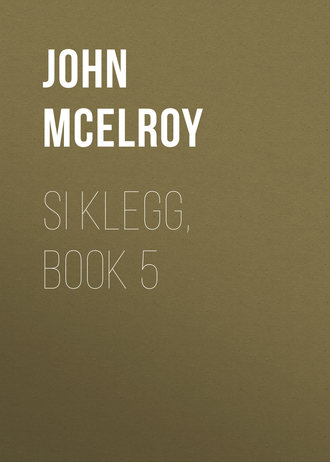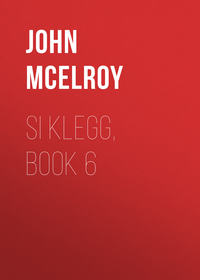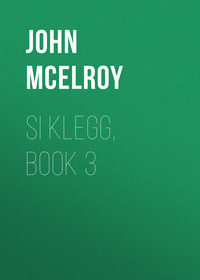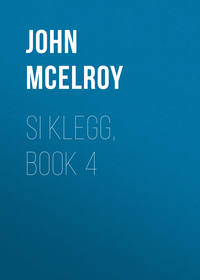 полная версия
полная версияSi Klegg, Book 5
"I'm your huckleberry," said Shorty.
"I knew you'd be," answered the Lieutenant; "so I got the General to let me have you. We'll get some 10 or 12 other good boys. That will be enough. I understand that there are about 100 regular attendants at the lodge, but they'll not all be there at any time, and a dozen of us can easily handle what we find there at home."
"A dozen'll be a great plenty," assented Shorty. "More'd be in the way."
"Well, go out and pick up that many of the right kind of boys, bring them here, and have them all ready by 10 o'clock. You can find guns and ammunition for them in that room upstairs."
Shorty's first thought was of his old friend, Bob Ramsey, Sergeant of the Provost-Guard. He found him, and said:
"See here, Bob, I've got something on hand better'n roundin' up stragglers and squelchin' whisky rows. I've got to pick out some men for a little raid, where there'll be a chance for a red-hot shindy. Want to go along?"
"You bet," answered the Sergeant. "How many men do you want? I'll get 'em and go right along."
"No, you don't," answered Shorty. "I'm to be the non-commish of this crowd. A Lieutenant'll go along for style, but I'll run the thing."
"But you're only a Corporal, while I'm a Sergeant," protested Bob. "'Taint natural that you should go ahead of me. Why can't you and I run it together, you next to me? That's the correct thing."
"Well, then," said Shorty, turning away, "you stay and run your old Provo-Guard. This is my show, and I aint goin' to let nobody in it ahead o' me."
"Come, now, be reasonable," pleaded Bob. "Why can't you and I go along together and run the thing? We'll pull together all right. You know I've been a Sergeant for a long time, and know all about the handling of men."
"Well, stay here and handle 'em. I'll handle the men that I take, all right. You kin gamble on that. And what I say to them has to go. Won't have nobody along that outranks me."
"Well," answered Bob, with a gulp, "let me go along, then, as a Corporal—I'll change my blouse and borrow a Corporal's—"
"Rankin' after me?" inquired Shorty.
"Yes; we had a Corporal promoted day before yesterday. I'll borrow his blouse."
"Promoted day before yesterday," communed Shorty; "and you won't presume to boss or command no more'n he would?"
"Not a mite," asserted Bob.
"Well, then, you kin come along, and I'll be mighty glad to have you, for I know you're a standup feller and a good friend o' mine, and I always want to oblige a friend by lettin' him have a share in any good fight I have on hand."
Jeff Wilson, the Chief Clerk, got wind of the expedition, and he too begged to be taken along, to which Shorty consented.
When Lieut. Bigelow came in at 10 o'clock he found Shorty at the head of 12 good men, all armed and equipped, and eager for the service.
"In talking with the Secret Service men," explained the Lieutenant, "they suggested that it would be well to have one good man, a stranger, dressed in citizen's clothes—butternut jeans, if possible—to go ahead at times and reconnoiter. He ought to be able to play off refugee rebel, if possible."
"I'll do it. I'm just the man," said Shorty eagerly.
"Well, just come in here," said the Lieutenant. "Now, there's a lot of butternut jeans. I guess there's a pair of pantaloons long enough for you."
When Shorty emerged from the room again there was a complete transformation. Except that his hair was cut close, he was a perfect reproduction of the tall, gaunt, slouching Tennesseean.
"Perfect," said the Lieutenant, handing him a couple of heavy Remington revolvers. "Stow these somewhere about your clothes, and get that blacking off your shoes as soon as you can, and you'll do."
It was planned that they should sleep until near morning, when the spies of the Knights of the Golden Circle were not alert, enter a freight-car, which they would keep tightly shut, to escape observation, while the train ran all day toward a point within easy reach of their quarry. It would arrive there after dark, and so they hoped to catch the Knights entirely unawares, and in the full bloom of their audacity and pride.
The car which the squad entered was locked and sealed, and labeled, "Perishable freight. Do not delay." Their presence was kept secret from all the train hands but the conductor, a man of known loyalty and discretion.
Shorty being in disguise, it was decided that he should saunter down apart from the rest and take his place in the caboose. He lay down on the long seat, drew his slouch-hat over his eyes, and seemed to go to sleep. The train pulled out to the edge of the yard, went onto a switch and waited for the early morning accommodation to pass out and get the right-of-way.
A heavily-built, middle-aged man, whose coarse face had evidently been closely shaved a few days before, entered, carrying a large carpet-sack, which was well-filled and seemingly quite heavy. He set this carefully down on the seat, in the corner, walked up to the stove, warmed his hands, glanced sharply at Shorty, said "Good morning," to which Shorty replied with a snore, took a plug of tobacco from his pocket, from which he cut a liberal chew with a long dirk that he opened by giving a skillful flip with his wrist, put the chew in his mouth, released the spring which held the blade in place, put both knife and tobacco in his pocket, and turning around spread the tails of his seedy black frock coat, and seemed lost in meditation as he warmed.
"Not a farmer, storekeeper or stock-buyer," Shorty mentally sized him up, "Looks more like a hickory lawyer, herb-doctor or tin-horn gambler. What's he doin' in this caboose? Up to some devilment, no doubt. He'll bear watchin'."
And Shorty gave another snore. The man, having completed his warming, sat down by his carpetsack, laid his arm across it to secure possession, pulled his battered silk hat down over his eyes, and tried to go to sleep.
The train rumbled out, and presently stopped at another station. Another man got on, also carrying a large, heavy carpet-sack. He was younger than the other, looked like a farm-hand, was dressed partly in homespun, partly in "store-clothes," wore a weather-stained wool hat, and his sullen face terminated in a goatee. The first-comer looked him over an instant, and then said:
"Were you out late last night?"
"I was," replied the second-comer, scanning his interrogator.
"Did you see a star?"
"I did."
"What star was it?"
"It was the Star of Bethlehem."
"Right, my brother," responded the other, putting out his hand in a peculiar way for the grip of the order.
Shorty, still feigning deep sleep, pricked up his ears and drank in every word. He had heard before of the greeting formula by which Knights of the Golden Circle recognized one another, and he tried, with only partial success, to see the grip.
He saw the two men whisper together and tap their carpet-sacks significantly. They seemed to come to a familiar understanding at once, but they talked so low that Shorty could not catch their words, except once when the first-comer raised his voice to penetrate the din as they crossed a bridge, and did not lower it quickly enough after passing, and Shorty heard;
"They'll all be certain to be there tonight."
And the other asked: "And the raid'll be made ter-morrer?"
The first-comer replied with a nod. At the next bridge the same thing occurred, and Shorty caught the words:
"They've no idee. We'll ketch 'em clean offen their guard."
"And the others'll come out?" asked the second-comer.
"Certainly," said the first, lowering his voice again, but the look on his face and the way he pointed indicated to Shorty that he was saying that other lodges scattered through the neighborhood were only waiting the striking of the first blow to rise in force and march on Indianapolis, release the rebel prisoners there and carry havoc generally.
"I see through it all," Shorty communed with himself. "They're goin' to the same place that we are, and've got them carpet-bags filled with revolvers and cartridges. Somebody's goin' to have a little surprise party before he's a day older."
The sun had now gotten so high that Shorty could hardly pretend to sleep longer. He gave a tremendous yawn and sat up. The older man regarded him attentively, the other sullenly.
"You must've bin out late last night, stranger," said the first.
"I was," answered Shorty, giving him a meaning look.
"Did you see a star?" inquired the older man.
"I did," answered Shorty.
"What star was it?"
"The Star of Bethlehem," answered Shorty boldly.
"'You're right, my brother," said the man, putting out his hand for the grip. Shorty did the same, trying to imitate what he had seen. The car was lurching, and the grasp was imperfect. The man seemed only half satisfied. Shorty saw this, and with his customary impudence determined to put the onus of recognition on the other side. He drew his hand back as if disappointed, and turned a severe look upon the other man.
"Where are you from?" asked the first-comer. Shorty curtly indicated the other side of the Ohio by a nod.
"Where are you goin'?"
Shorty's face put on a severe look, as if his questioner was too inquisitive. "Jest up here to 'tend to some bizness," he answered briefly, and turned away as if to close the conversation.
"Say, I've got a right to know something about you," said the first new-comer. "I'm Captain of this District, and have general charge o' things here, and men passin' through."
"All right," answered Shorty. "Have general charge. I don't know you, and I have bizness with men who roost a good deal higher'n you do."
He put his hands to his breast, as if assuring himself of the presence of important papers, and pulled out a little ways the official-looking envelope which contained his transportation and passes. This had its effect. The "Captain" weakened. "Are you from the Southern army?" he asked in a tone of respect.
"Before I answer any o' your questions," said Shorty authoritatively, "prove to me who you are." "O, I kin do that quick enough," said the "Captain" eagerly, displaying on his vest the silver star, which was the badge of his rank, and his floridly printed commission and a badly-thumb-marked copy of the ritual of the Knights of the Golden Circle.
"So far, so good," said Shorty. "Now give me the grip."
Shorty, by watching the motions of the other's hand, was skillful enough to catch on to the grip this time, and get it exactly. He expressed himself satisfied, and as the car lay on the siding waiting for another train to arrive and pass he favored his two companions with one of his finest fictions about his home in Tennessee, his service in the rebel army, the number of Yankee Abolitionists he had slain with his own hand, and his present mission with important communications to those "friends of the South in Illinois" who were organizing a movement to stop the bloody and brutal war upon his beloved Southland.
His volubility excited that of the "Captain," who related how he had been doing a prosperous business running a bar on a Lower Mississippi River boat, until Abolition fanaticism brought on the war; that he had then started a "grocery" in Jeffersonville, which the Provost-Marshal had wickedly suppressed, and now he was joining with others of his oppressed and patriotic fellow-citizens to stop the cruel and unnatural struggle against their brethren of the South.
"And we shall do it," he said warmly, bringing out the savage-looking dirk, throwing it open with a deft movement of his wrist, and shaving off a huge chew of tobacco. "We have a hundred thousand drilled and armed men here in the State of Injianny, jest waitin' the word, to throw off the shackles of tyranny and destroy the tyrants.
"There's another hundred thousand in Illinois and like numbers in other States. And they'll fight, too. They'll fight to the death, and every one of them is good for' at least three of the usurper Lincoln's minions. I'd like nothing better than to get a good opportunity at three or four o' 'em, armed with nothin' more'n this knife. I'd like nothin' better than the chance to sock it into their black hearts. 'Twouldn't be the first time, nuther. The catfish around Jeffersonville could tell some stories if they could talk, about the Lincoln hounds I've fed to 'em. I only want a good chance at 'em agin. I may go, but I'll take several of 'em with me. I'll die in my tracks afore I'll stand this any longer. I hate everything that wears blue worse'n I do a mad-dog."
"And I promise you," said Shorty solemnly, "that you shall have all the chance you want sooner'n you think for. I know a great deal more'n I dare tell you now, but things is workin' to a head mighty fast, and you'll hear something drop before the next change o' the moon. You kin jest bet your shirt on that."
The day was passing, and as the evening approached the train was running through a wilder, heavily-wooded country. Shorty's companions took their seats on the opposite side of the car and peered anxiously out of the window to recognize features of the darkening landscape. They were evidently getting near their destination.
Shorty overheard the "Captain" say to his partner:
"The train'll stop for water in the middle of a big beech woods. We'll get off there and take a path that leads right to the lodge."
"How far'll we have to tote these heavy carpetbags?" grumbled the other.
Shorty slipped his hand into his pocket, grasped his revolvers and eased them around so that he could be certain to draw them when he wanted to. He was determined that those men should not leave the train before the stopping place arranged for his fellow-soldiers. He felt confident of being able to handle the two, but did not know how many confederates might be in waiting for them.
"I'll go it if there's a million of 'em," said he to himself. "I'll save these two fellers anyway, if there's any good in 45-caliber bullets in their carcasses. I'm jest achin' to put a half-ounce o' lead jest where that old scoundrel hatches his devilment."
The engine whistled long and shrilly.
"That's the pumpin'-station," said the "Captain," rising and laying hold of the handles of the carpetbag.
"Drop that. You can't leave this car till I give the word," said Shorty, rising as the train stopped, and putting himself in the door.
"Can't, eh?" said the "Captain," with a look of rage as he comprehended the situation. His dirk came out and opened with a wicked snap. "I'll cut your black heart out, you infernal spy."
"You will, eh?" sneered Shorty, covering him with a heavy Remington. "How'd you like the looks o' that, old butternut? Your murderin' dirk aint deuce high. Move a step, and you'll know how it feels to have daylight through you."
The "Captain" smashed the window with a backward blow of his fist, thrust his head out and yelled the rallying-cry of the Knights:
"Asa! Asa!"
The sound of rushing feet was heard, and a man armed with a shot-gun came into the plane of light from the open caboose door. Shorty was on the lookout for him, and as he appeared, shouted;
"Halt, there! Drop that gun. If you move I'll kill this whelp here and then you."
"Do as he says, Stallins," groaned the frightened "Captain." "He's got the drop on me. Drop your gun, but holler to the boys in the front car to come out."
To Shorty's amazement a score of men came rushing back from the car next ahead of the caboose. They had, by a preconcerted arrangement, been jumping on the train ever since it grew dark, and collected in that car. Some of them had guns, but the most appeared unarmed.
"Well, I have stirred up a yaller-jacket's nest for sure," thought Shorty, rather tickled at the odds which were arrayed against him. "But I believe I kin handle 'em until either the train pulls out or the boys hear the ruction and come to my help."
Then he called out sternly as he raised the revolver in his left hand:
"I'll shoot the first man that attempts to come on this car, and I'll kill your Captain, that I've got covered, dead. You man with that shot-gun, p'int it straight up in the air or I'll drop you in your tracks. Now fire off both barrels."
It seemed to every man in the gang that Shorty's left-hand revolver was pointing straight at him. The man with the shot-gun was more than certain of this, and he at once complied with the order.
There was a whistle, followed by a rush of men from a line further out, and every man of those around Shorty was either knocked down or rudely punched with a musket-barrel in the hands of Lieut. Bigelow's squad.
"What in the world made you so long comin'?" asked Shorty, after all the prisoners had been secured. "Was you asleep?"
"No," answered the Lieutenant. "This is the place where we intended to get off. We were quietly getting out so as to attract no notice when you started your circus. I saw you were doing well, hiving those fellows together, so I let you go ahead, while I slipped the boys around to gather them all in. Pretty neat job for a starter, wasn't it?"
CHAPTER XIII. AN UNEXPECTED MEETING
BREAKING UP A DEN OF COPPERHEADS"COME, hustle these prisoners back into the car in which we were," commanded the Lieutenant. "We'll leave it on the switch with a guard. Lock it up carefully, and one man'll be enough to guard it until we get back. Make haste, for we've no time to lose. Shorty."
"Corpril Elliott," Shorty corrected him, mindful of the presence of Sergeant Bob Ramsey.
"Yes; excuse me. Corporal Elliott, while we are attending to the prisoners you go on ahead and reconnoiter. You need not stop unless you see fit until you are clear into the lodge. Give one low whistle if you want us to stop, two to come ahead and three to go back."
It was a moonless night, and the broom-like tops of the close-growing beeches made a dense darkness, into which Shorty plunged, but he could readily make out a well-beaten path, which he followed. Occasionally he could make out dark figures moving just ahead of him or crossing the path.
"Goin' to be a full attendance at the services this evenin'," he muttered to himself. "But the more the merrier. It'll insure a goodly number at the mourner's bench when we make the call for the unconverted."
Big and lumbering as Shorty sometimes seemed in his careless hours, no wildcat gliding through the brush was more noiseless-footed than he now. He kept on the darker side of the path, but not a twig seemed to crack or a leaf rustle under his heavy brogans. Twice he heard lumbering steps in his rear, and he slipped behind the big trunk of a tree, and saw the men pass almost within arm's length, but without a suspicion of his presence.
"Well, for men workin' a dark-lantern job this is about the logiest crowd I ever struck," he said rather disgustedly. "An elephant'd have to step on 'em before they'd know he was around. They ain't hardly good fun."
Presently he heard some rustling over to his right and caught the low murmur of a voice. He cautiously made his way in that direction until he made an opening, with a number of men sitting on a log, while others were standing, leaning on their guns.
"Probably a caucus outside to set up the pins before goin' into the full meetin'," he said to himself. "As I always like to be with the winnin' side, I guess I'll jest jine 'em."
He advanced boldly into the opening. At the sound of his approach the men looked up, and one of those leaning on his gun picked it up and came toward him.
"You are out late," he whispered, when within speaking distance.
"Yes," answered Shorty. "And I was out late last night."
"Did you see a star?"
"I did."
"What star was it?"
"It was the Star of Bethlehem."
The first speaker had seemed to start at the sound of Shorty's voice, but he recovered himself, and saying, "You're right, my brother," put out his hand for the grip.
"'Taint right, neither," hissed Shorty. "Si Klegg, what are you doin' here?"
"Shorty!" ejaculated Si, joyfully, but still in a whisper. "I thought I knowed your voice. Where in the world did you come from?"
"I'm here on business," answered Shorty. "I came up from Headquarters at Jeffersonville. What brung you here?"
"O," said Si, "we've bin hearin' about this Copperhead lodge for some time, and some of us boys who's home on furlough thought that we'd come down here with the Deputy Provo and bust it up. We've bin plannin' it a week or two. All these that you see, there are soldiers. I've 15, includin' myself."
The boys hastily conferred together as to the plan of operations, and one man was hurried back to inform Lieut. Bigelow of the presence of the other squad.
"You seem to know most about this affair. Shorty," said Si. "You take command and make arrangements."
"Not for a minute. Si," protested Shorty. "You rank me and you must command, and I want you to hold your own over Bob Ramsey, who will try to rank you. Bob's a good boy, but he's rather too much stuck on his stripes."
It was finally arranged that Si should move his squad out to near the edge of the path and wait for Lieut. Bigelow to come up, while Shorty should go forward and reconnoiter.
Shorty walked along the path toward the lodge. Suddenly the large figure of a man loomed up before him, standing motionless, on guard, in the road.
"You are out late, my friend," said he.
"Yes," answered Shorty.
"Did you see a star?"
"Yes."
"What was it?"
"The Star of Bethlehem."
"You are right, my brother," said the man, extending his hand for the grip.
"This rotten star-and-brother rigmarole's making me sick," muttered Shorty, with a hasty glance to see that the man was alone, and grasping his hand with a grip of iron, while with his left he clutched the sentry's throat. Before the man could utter a groan he wrenched him around and started him back for Si. Arriving there he flung him under the trees, saying in a loud whisper:
"First sucker o' this Spring's run. String him. Si."
Lieut. Bigelow had come up in the meanwhile with the other squad, and they all moved cautiously forward to where they could get a dim sight of the lodge through the intervals between the trees. For a log house it was quite a large building, and stood in the center of a small clearing which had been made to furnish logs for its erection. Faint gleams of light came through the badly-chinked walls, and the hum of voices showed that there was a large crowd gathered inside.
"There's likely to be from 100 to 150 in there," said the Lieutenant, after a moment's consideration. "We've got 27 or 28. We'll jump them, though, if they're a thousand. Corporal Elliott, you go forward and make your way inside, if you can, and see what they are doing. If you can get inside, stay 10 or 15 minutes, and come out and report. If you can't get out, or you think they are ripe for jumping, whistle, and we'll pile in. Sergeant Klegg, you hold your squad together and move down as near the door as you can without being seen and be ready for a rush. Find a rail or a log to smash the door in if they try to hold it against us. Sergeant Ramsey, deploy your men quietly around to the rear there to cut off retreat, but be ready to rally again and help Sergeant Klegg out if he strikes a big snag. You make the circuit of the house and post yourself where you can see what's going on, and signal your men. Everybody keep under the shadow of the trees and make no noise. Go on to the house, Corporal."
Shorty left the cover of the trees and walked directly toward the front door. No one appeared or halted him until he pushed the front door open. Then a man who seemed more intent on what was going on inside than the new arrival, bent his head over to catch the farrago about the star, and put out his hand for the grip.
"Come on in, but don't make a noise," he whispered. "They're givin' the obligation, and I want to hear it."
Shorty stood beside him for a moment, and then watched his opportunity, and pressed by him, to where he could see into the room. It was entirely dark except for the light of a single candle, shaded so that its rays fell upon a rude altar in the center of the room, draped with a rebel flag. Upon this lay a naked sword, skull and cross-bones. Behind the altar stood a masked man, draped in a long shroud, who was mouthing in a sepulchral tone the obligation to several men kneeling in front of the altar. The dim light faintly revealed other masked and shrouded figures stationed at various places about the room and looming above the seated audience.









